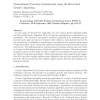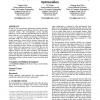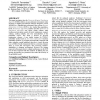6 search results - page 1 / 2 » Dual-population genetic algorithm for nonstationary optimiza... |
PPSN
1992
Springer
13 years 8 months ago
1992
Springer
In this paper, we describe the application of a new type of genetic algorithm called the Structured Genetic Algorithm (sGA) for function optimization in nonstationary environments...
GECCO
2008
Springer
13 years 5 months ago
2008
Springer
In order to solve nonstationary optimization problems efficiently, evolutionary algorithms need sufficient diversity to adapt to environmental changes. The dual-population genetic...
CEC
2008
IEEE
13 years 11 months ago
2008
IEEE
— In this paper, a multi-agent based evolutionary algorithm (MAEA) is introduced to solve dynamic optimization problems. The agents simulate living organism features and co-evolv...
GECCO
2004
Springer
13 years 10 months ago
2004
Springer
Low diversity in a genetic algorithm (GA) can cause the search to become stagnant upon reaching a local optimum. To some extent, non-stationary tasks avoid this problem, which woul...
GECCO
2008
Springer
13 years 5 months ago
2008
Springer
This paper investigates how the Univariate Marginal Distribution Algorithm (UMDA) behaves in non-stationary environments when engaging in sampling and selection strategies designe...



